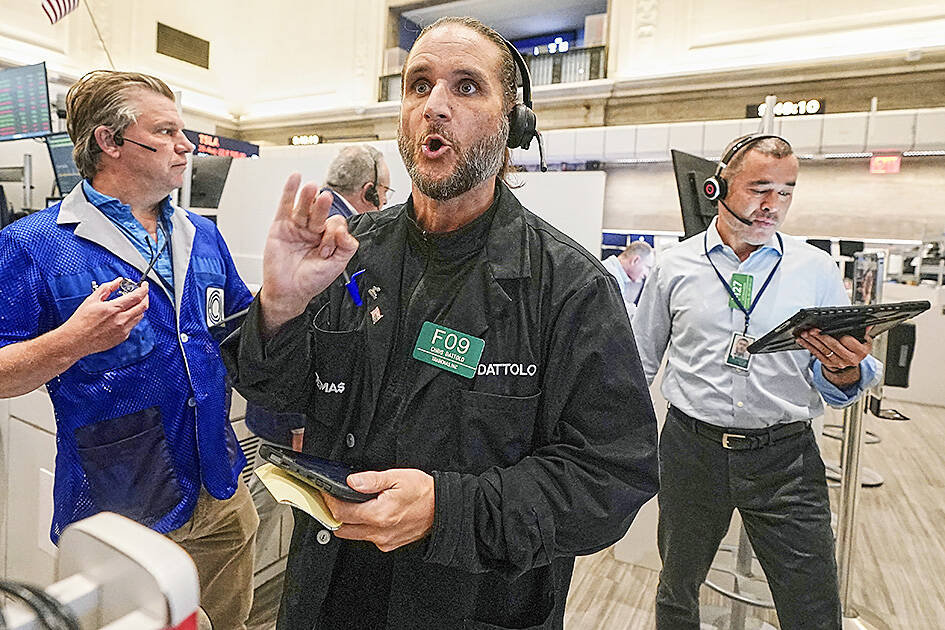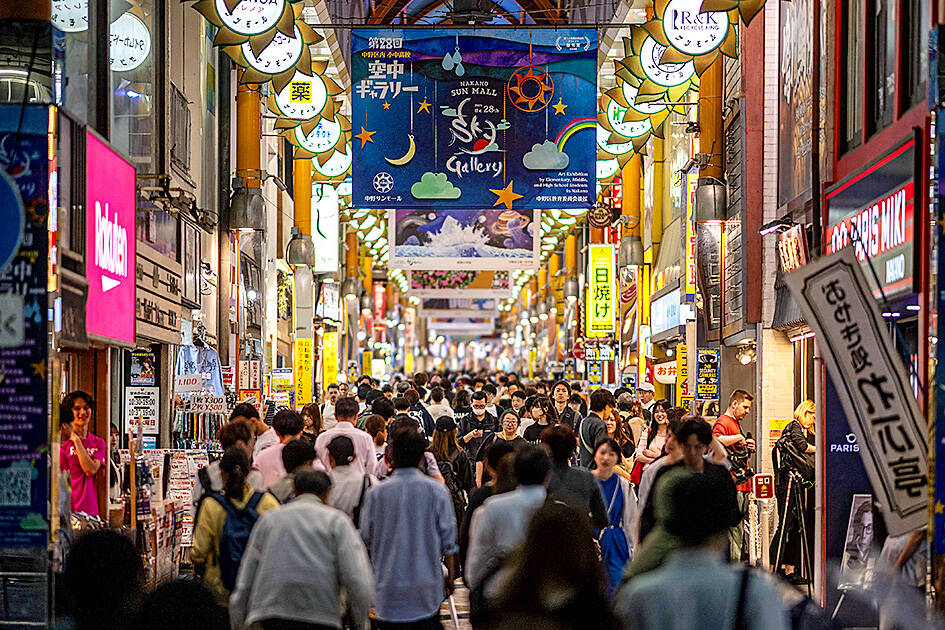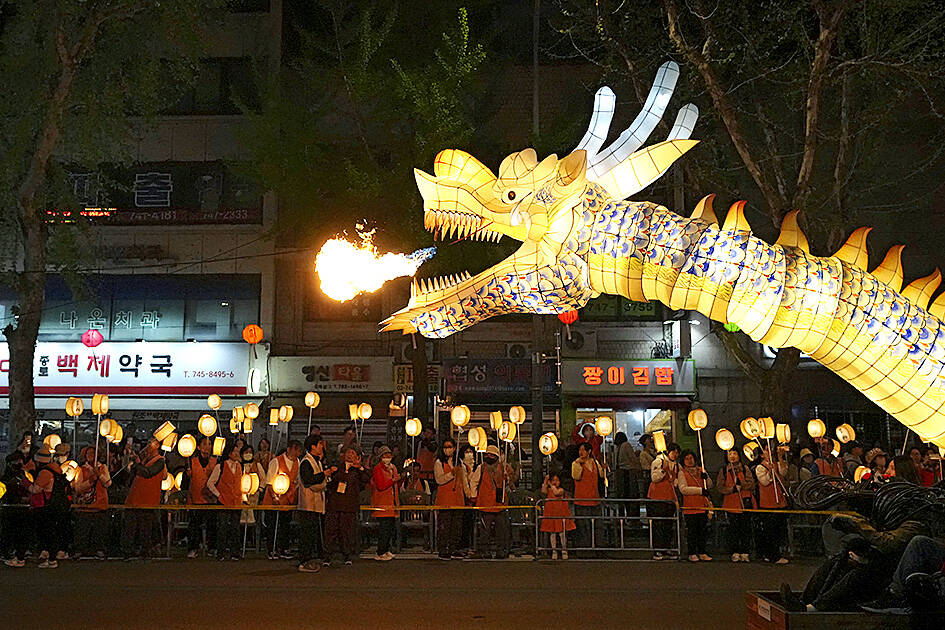Who would say work was fun? Your job might be rewarding (some of the time). You may get on with your colleagues (some of them). But fun? It seems simultaneously too grand an ambition and too small.
After the work-centric “hustle culture” of the 2010s, then the backlash and widespread burnout brought on by the COVID-19 pandemic, the general feeling around work right now could be described as ambivalent at best. At worst, it’s openly combative, as evinced by frequent references to the “battle” over working from home. Managers want employees back in the office; employees want flexibility, and to limit work’s impact on their lives.
Gen Z, who have replaced millennials as the youthful influence shaping the workforce, are especially adamant that it should not intrude on their boundaries. Meanwhile, AI looms, threatening large-scale unemployment.

Photo: AP
The world of work is in flux, with a fight for our time and our livelihoods at the center. Fun doesn’t seem to factor into it — but Bree Groff argues that it should.
An organizational consultant and “change expert” at the New York-based company SYPartners, Groff has worked with C-suite leaders — people whose job titles begin with the word “chief” — at Google, Microsoft, Hilton, Calvin Klein, Pfizer and other big names, to transform their corporate culture and improve their employees’ time at work. She has drawn on that experience for her first book, << LIVE TO WORK? Photo: AFP It may sound naive, but Groff’s breezy tone belies the wisdom of her point: work should be enjoyable. Too often, it is wildly out of proportion: we either “live to work,” and equate our personal worth with our productivity, our jobs with ourselves; or we’re resigned to the fact “work sucks,” and live for the weekend. Neither view is particularly healthy, sustainable or rewarding. << Her own reckoning with work came in January 2022, when her mother was diagnosed with terminal cancer; her father had already been diagnosed with Alzheimer’s. An only child, Groff took immediate leave to dedicate herself to their care. When her mother died later that year, it gave Groff a new perspective on how she was spending her time, she says. Photo: AP “I’m going to run out of Mondays, just like my mother ran out of Mondays … there was this newfound urgency,” she says. At the same time, Groff was alert to the post-pandemic crisis in employee engagement, manifesting in “the Great Resignation” and “quiet quitting,” or doing the bare minimum. “I felt like I had something that I could share that would help people,” she says. Groff knew “for a fact” that work could be fun. She grew up in Chicago, where her mother was a kindergarten teacher and her father was an elementary school principal. Both evidently loved their jobs, without letting them derail their lives or define their identities. It was a shock, when Groff entered the working world herself, to find it weighed down by so much baggage: back-to-back meetings, no time for bathroom or meal breaks, emails at all hours and busy work with no obvious point. The trouble is not so much work itself, Groff says, but all the “patently ridiculous, if not outright dangerous” trappings and norms that come with it — chief among them the expectation that it may come at the expense of sleep, relationships or wellbeing. We get paid to create value, not to suffer, Groff points out. “At its most essential, work is showing off our skills, creating something other people appreciate, working with others, figuring out challenges,” she says. “If that’s all fun, then how can we save that part?” TACKLING PROFESSIONALISM One way, she suggests, is by tackling “professionalism.” It’s usually prescriptive, allowing for only one version of leadership or success, and discourages people from showing up at work as rounded human beings. “You just sort of have to play along, like you’re in some sort of performance,” Groff says. She appears on Zoom today with her hair still wet from the shower. In the book, she describes this as one of her small but routine displays of resistance to professional dress codes — which, she argues, are representative of an approach to work that’s unnecessarily dreary, rigid and even infantilizing. “You’re just as smart in your workout gear as you would be in a blouse,” Groff says, when I confess to wearing leggings off-camera. But, since the post-pandemic reckoning, there is a widespread feeling of fatalism that prevents us from aspiring to make work better. “We’ve normalized this idea that work is just drudgery and we do it because we have to,” Groff says. It may reflect an overcorrection to hustle culture, born of the Silicon Valley startup boom. Tech founders and influencer-entrepreneurs taught a generation that you could achieve anything if you just leaned in and embraced the “grindset.” With company perks such as free meals, bottomless snacks and even office ball pits, it didn’t even have to be a sacrifice — work could be fun. Groff rejects that version as being more of a bribe. “Companies want employees to have fun so they overwork and devote their lives to the business,” she says. “You start to think: ‘Wait, was that a free lunch just so that I don’t leave the building?’” Even learning and development, often framed as a benefit, could be seen as cultivating people to be company assets, Groff says. With Apple, Meta, Google and other big companies even footing the bill for employees to freeze their eggs, “you start to enter this dystopia … The more we intertwine ourselves with our employers, the harder it is to feel a sense of independence, and the harder it is to leave.” Indeed, since burnout became a mainstream concern, there is greater awareness that over-investment in work as a source of happiness, identity or meaning leaves people open to being exploited. The fact is, Groff continues, C-suite executives have a greater stake in the success of their businesses, as is reflected in their paychecks. They shouldn’t expect the rest of the workforce to feel equally motivated to go above and beyond. “It’s so obvious for leaders to tout that message that ‘we’re changing the world,’ but it puts any employee in the position of asking themselves, ‘Wait, do I want to change the world, or do I want to go home and cook dinner?’” The tussle over hybrid and remote working is causing trust to break down on both sides, Groff says, encouraging surveillance from management and presenteeism — showing up to work while unwell and being less productive — from employees. Lack of flexibility is also widely cited as a factor in plummeting levels of employee engagement. Gallup’s recent State of the Global Workplace report found that just one in 10 UK workers felt engaged, one of the lowest rates globally. In the US, it was nearly one in three — still a 10-year low. Perhaps, Groff suggests, if work was more fun, there wouldn’t be the same power play over where people do their work; they may even be eager to come into the office. THRIVING VS SURVIVING Fun has repeatedly been shown to be a factor in the difference between thriving and just surviving at work. Gallup’s survey of German adults found that 81 percent of engaged workers reported having fun at work in the past week, compared with only 10 percent of those who were disengaged. “Being miserable at work can even make your life worse than having no work at all,” researchers concluded. There is a “massive” business case for making work more fun — but that’s not why we should prioritize it, Groff says. In << Fun is a good metric because it’s hard to force, or fake. Instead of trying to lure workers back to the office with free lunches, employers could consider what it feels like to spend time there, Groff says. “Are people — especially the leaders — relaxed and happy and joking? Is it a fun place to be, or is everybody just in meeting rooms in their button-downs all day?” Though Groff’s focus is primarily on office workers, everyone’s experience of work could be improved by making it more fun, she argues. “Maybe you work at the steel mill, but there’s got to be a break room somewhere.” Even surgeons sometimes joke around. In Today Was Fun, Groff uses the example of Peter Attia, a Stanford-educated surgeon who went through a period of playing clips from the cult film Napoleon Dynamite while performing various transplants. “For an entire month … we never stopped laughing at this thing,” Attia said on his podcast, adding that, if anything, it seemed to improve patients’ outcomes. While it’s unrealistic to expect work to be all fun, all the time, believing that “most work, most days, should be fun” can give us a helpful steer. “Did I have fun today?” can be an unexpectedly clarifying question. “Think of what needs to be in place first. If you’re stressed and sleep-deprived, you’re probably not having fun,” Groff says. Of course, Groff acknowledges, sometimes a job is just a job, especially during an economic downturn. But even small tweaks to your role can make a difference to your day-to-day experience. “Usually, with a little bit of planning, you can make some sort of shift. I think it’s still possible for us to say, ‘What are the kinds of days I want to have?’” Life is too short to spend five days out of every seven willing time to pass. Our ability to have fun could even prove our competitive edge against AI. Robots, after all, can’t have fun — so they can take on all the boring, repetitive or soul-sucking bits, Groff suggests, and we can find an approach to work that prioritizes joy, relationships and wellbeing. “I don’t need to feel like I’m changing the world, and I don’t want to feel crappy about it — but is there a way to have a good day, improve somebody else’s life, maybe make a friend? Maybe that’s plenty.”
People on June 14 visit a shopping street in Tokyo’s Nakano district. According to Swiss firm International Workplace Group, Tokyo is the world’s most remote-work-friendly cities.

People holding lanterns on April 26 watch as a giant lantern moves in a parade during the Lotus Lantern Festival ahead of the Buddha’s birthday on May 5, in downtown Seoul, South Korea. According to Swiss firm International Workplace Group, Seoul is the world’s fourth most remote-work-friendly cities.

Cheng Ching-hsiang (鄭青祥) turned a small triangle of concrete jammed between two old shops into a cool little bar called 9dimension. In front of the shop, a steampunk-like structure was welded by himself to serve as a booth where he prepares cocktails. “Yancheng used to be just old people,” he says, “but now young people are coming and creating the New Yancheng.” Around the corner, Yu Hsiu-jao (饒毓琇), opened Tiny Cafe. True to its name, it is the size of a cupboard and serves cold-brewed coffee. “Small shops are so special and have personality,” she says, “people come to Yancheng to find such treasures.” She

Late last month Philippines Foreign Affairs Secretary Theresa Lazaro told the Philippine Senate that the nation has sufficient funds to evacuate the nearly 170,000 Filipino residents in Taiwan, 84 percent of whom are migrant workers, in the event of war. Agencies have been exploring evacuation scenarios since early this year, she said. She also observed that since the Philippines has only limited ships, the government is consulting security agencies for alternatives. Filipinos are a distant third in overall migrant worker population. Indonesia has over 248,000 workers, followed by roughly 240,000 Vietnamese. It should be noted that there are another 170,000

Hannah Liao (廖宸萱) recalls the harassment she experienced on dating apps, an experience that left her frightened and disgusted. “I’ve tried some voice-based dating apps,” the 30-year-old says. “Right away, some guys would say things like, ‘Wanna talk dirty?’ or ‘Wanna suck my d**k?’” she says. Liao’s story is not unique. Ministry of Health and Welfare statistics show a more than 50 percent rise in sexual assault cases related to online encounters over the past five years. In 2023 alone, women comprised 7,698 of the 9,413 reported victims. Faced with a dating landscape that can feel more predatory than promising, many in

“This is one of those rare bits of TikTok fitness advice with a lot of truth behind it,” says Bethan Crouse, performance nutritionist at Loughborough University. “Sometimes it’s taken a bit too literally, though! You see people chugging protein drinks as they’re scanning out of their gym.” Crouse recommends the athletes she works with consume 20-30g of protein within 30-60 minutes of finishing a resistance training session. “The act of exercising our muscles increases the breakdown of muscle proteins,” she says. “In order to restore, or hopefully improve them — and get gains such as increased muscle mass or strength —